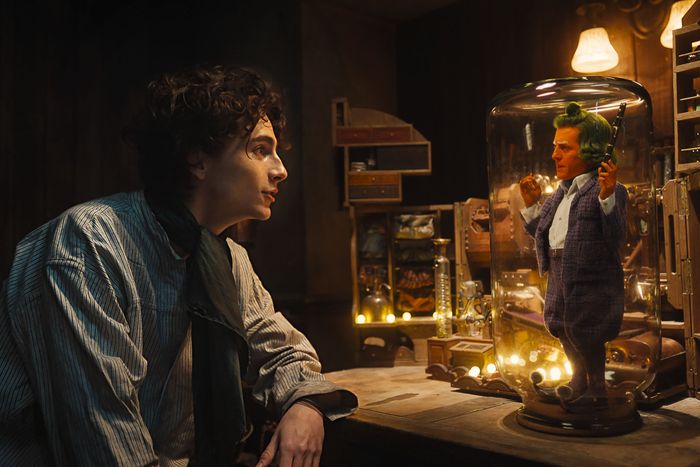
This review was originally published on December 14, 2023. Wonka is now available to stream on Max.
Timothée Chalamet is the worst part of Wonka, which isn’t to say that he’s bad in the movie — just hesitant, like he’s working in an idiom that doesn’t come naturally to him, which is odd. Dig up any of the videos from his pre-fame days at La Guardia High School and it would seem indisputable that there’s a theater kid lurking within Hollywood’s current crown prince. But when actually called upon to sing and dance while wearing a magenta velvet frock coat and top hat, Chalamet displays the tentativeness of someone who only recently emerged from the prelapsarian bliss of childhood into an adolescent’s awareness of the possibility of being embarrassed. Even when he’s belting out an opening number that takes place on a ship and isn’t not reminiscent of “A Piece of Sky” from Yentl, he can’t summon the arms-outstretched abandon the part demands. His isn’t the kind of voice that would effortlessly resonate off the back wall of a 1,200-seat theater, but it isn’t a bad one, either — he just doesn’t commit.
What he does instead is try to find the emotional realism of the magical chocolatier whose origins Wonka aims to explore with a story involving a pseudo-European city run by a nefarious chocolate cartel. I appreciate how alarming this sounds. Willy Wonka, the signature Roald Dahl creation, is defined by his eccentricity, his mercurial personality, and a deliciously complicated relationship with the children who are his primary customer base. Previous attempts to explain why he is the way he is have been dire. To watch Chalamet attempt to plumb the soul of this sexless sprite of a man who believes that sharing his fantastical confectionery with the world will bring back his late mother is to watch an actor attempt the impossible, or at least the very ill advised. And yet! Wonka is the work of Paul King, who wrote the screenplay with Simon Farnaby in addition to directing, and King is the talent behind Paddington and its equally beloved sequel. While his Charlie and the Chocolate Factory prequel includes few flashes of Dahl-worthy perversity, it’s more interested in recreating the melancholy sweetness of King’s previous features, and it does so with a surprising degree of success.
In that mode, Chalamet’s approach, while not quite right, doesn’t feel all that jarring either. Anyway, everyone else in the film makes up for his restraint with performances that hit the mark when it comes to outsize but un-saccharine whimsy. King has excellent taste in comedians and character actors, and he packs his cast with both. It’s not a revelation that the infallible Olivia Colman is a standout as secondary villain Mrs. Scrubbit, an innkeeper with Mrs. Lovett-from–Sweeney Todd vibes, with an equally amusing Tom Davis as her accomplice Bleacher. Scrubbit’s nefarious scheme involves less cannibalism and more indentured servitude — she tricks people into agreeing to contracts that leave them in outrageous amounts of debt, which they’re forced to work off in her basement laundry service. Willy rolls into town on a several-year stint as a ship’s cook and soon ends up trapped down there himself — he doesn’t read the small print on the contract he signs for his room because, it turns out, he can’t read. This conveniently puts him in contact with fellow victims and eventual co-conspirators Abacus (Jim Carter), Larry (Rich Fulcher), Piper (Natasha Rothwell), and Lottie (Rakhee Thakrar), as well as young Noodle (Calah Lane), who’s the first to help Wonka escape during the day to peddle his wares.
Chocolate has to do a lot in Wonka. It’s akin to a drug, and not just because Wonka has to sell his sweets on the sly while evading the cops. The chief of police (Keegan-Michael Key) is getting paid off in bonbons by the owners of the community’s most famous chocolate shops (Paterson Joseph, Matt Lucas, and Mathew Baynton), who use their products to control the city, and the way his body expands with his addiction is the movie’s most meanly Dahl-esque joke. It’s a chocolate debt that ties Willy to Lofty, the Oompa Loompa played by a wonderfully pissy Hugh Grant, who really should have been kept a surprise instead of placed in all the marketing material. Chocolate is also, courtesy of Willy’s internationally sourced ingredients, capable of making people float, feel hope, and break into Broadway numbers, and it is, in a squishier way, a vehicle for nostalgia. The weirder its treatment of the treat becomes, the better the movie is, cutting through the script’s more potentially sentimental tendencies. It never reaches the singularly compelling strangeness of the source material, but it lands somewhere close enough to be mostly satisfying.
In that light, even Chalamet’s heartfelt weeping over memories of his beloved mom (Sally Hawkins), who taught him everything she knew about chocolate while neglecting to teach him how to read the letters of the name she wrote on the bars she made for him, feels right. Wonka’s answer to the “Pure Imagination” song from the 1971 adaptation is a number about wanting to make a chocolate shop that is, as Chalamet sings, “a world of our own, a place to escape to” — which is an awful lot to expect from a retail location, no matter how enchanted. No wonder the guy ends up a hermit locked away in his factory, coming up with plans to torture unruly children.
More Movie Reviews
- The Thriller Drop Is a Perfect Addition to the Bad-First-Date Canon
- The Accountant 2 Can Not Be Taken Seriously
- Another Simple Favor Is So Fun, Until It Gets So Dumb


